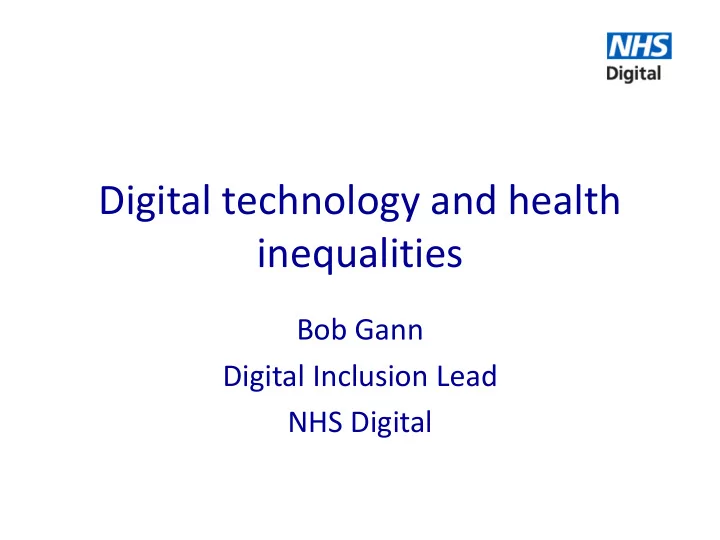

Digital technology and health inequalities Bob Gann Digital Inclusion Lead NHS Digital
Our digital life in 2025 “ Experts predict that in ten years the internet will be readily available, everywhere, at low cost – embedded in people’s lives for good & ill” “ The greatest impact will be on personal health. Health care will become self administered. We will detect, monitor, diagnose, get advice & treatment, through mobile, wearable & implanted network devices” “ But…we risk a dangerous divide between the digital haves & have- nots. Networked transactions may benefit smaller & smaller segments of the global population” Digital life in 2025. Pew Research Views of 2,500 experts & members of public
Today many of us can …. Self check our symptoms Carry out online transactions Compare & choose services Give consumer feedback Monitor health with wearables Join online communities
.. but many of us can’t UK’s digital divide 6m people (11% of population) have never used the internet 10m people lack basic digital skills ● 53% are over 65 ● 44% are social class DE ● 31% have a disability BBC Media Literacy & Office of National Statistics 2015
Digital inequality in Europe Most of European population (62%) uses the internet every day – but one in five Europeans have never been online There is wide variation between countries: 90% of Nordic population use internet every day but in Bulgaria and Romania it’s less than half. Many of those who are online lack basic digital . skills to make the most of technology. 47% of European population lack basic digital skills – and 65% of disadvantaged populations
Barriers to digital health literacy in developing countries • Lack of network infrastructure • Affordability • Lack of digital skills • Lack of relevant content in appropriate languages • Gender gap – 200m fewer women online than men
Digital health literacy & inequality • Those who are least likely to be online are those who most need health & care services • Information & services are increasingly digital - digital skills are increasingly essential to health literacy • Low health literacy closely linked to poorer health outcomes & mortality
Leaving no-one behind Develop partnerships Build the capacity of with the voluntary sector all citizens to access and industry to support information. digital inclusion Build better insight Ensure that the . into the barriers to digital opportunity digital inclusion is inclusive. Widen current programme of digital inclusion with the Tinder Foundation
What we’ve done to combat digital inequality Partnership between NHS and not-for- profit organisation – Good Things Foundation Mobilised network of 5,000 UK Online Centres in libraries (and other community locations including housing schemes, health centres, homeless shelters, pubs etc) Worked with over 350,000 digitally excluded people to provide supported online access and training to use digital health resources Widening Digital Participation
Impact on people & NHS • 82% of people trained were socially disadvantaged and likely to be experiencing health inequalities • 85% say they now feel more confident managing their health using online tools • 34% say they feel more self reliant and have reduced their use of the NHS for minor ailments • 63% say they have improved their diet • 11% say they have provided feedback on a health service • 38% say they have saved time by doing something online • 72% say they have saved money (eg avoiding travel costs) http://nhs.tinderfoundation.org/
Building blocks for the digital revolution Infrastructure • Universal free access to wi-fi in NHS premises and libraries Exclusion • Prioritise reaching the furthest first Skills & attitudes • Enable health workers to engage patients with digital Recommendations to NHS from Baroness Martha Lane Fox Dec 2015
Next steps • New programme 2017-2020 • Map digital exclusion heatmaps against indicators of local health inequalities • Prioritise reaching the furthest first • Procurement for new delivery partner and local digital inclusion pathfinders Jan – March 2017 • Range of interventions – digital skills, social prescribing, commissioning
bob.gann@nhs.net 07858 390042 Twitter: Bob_Gann #NHSWDP
Recommend
More recommend